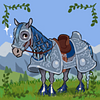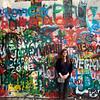Take a photo of a barcode or cover
72 reviews for:
Flying Couch - Ein Graphic Memoir: Eine jüdische Familiengeschichte dreier Frauengenerationen
Amy Kurzweil
72 reviews for:
Flying Couch - Ein Graphic Memoir: Eine jüdische Familiengeschichte dreier Frauengenerationen
Amy Kurzweil
Flying Couch interweaves the stories of three generations of women: the author, her mother, and her grandmother. Personally, I found the grandmother's stories about how she survived the Holocaust much more interesting than anything else in the book. I think it's a book that would probably appeal more to people who have experienced the same type of personal journey that the author has; for me, it was just a decent quick read.
"I wonder about roots. I wonder if shorter roots are thicker roots. Thicker roots have more knots and gnarls," writes Amy Kurzweil, the voice of three generations of Jewish women: herself, her mother, and her bubbe in Flying Couch.
Part graphic novel, part memoir, Kurzweil plunks us into her history, illuminating the looming female figures of her child and young adult hoods with equal clarity and restraint. Hers is a sparse narrative, turning it over to dialogue and bold frames of art as propellant for Jewish survival, identity, and wandering during two different times of oppression.
Kurzweil's story is nothing if not uniquely Jewish, as the nationality carries with it a sense of tradition, and isolation, that most others cannot claim. It is the longevity. It is the guilt, perhaps. The sense that you are not remembering, not honoring, enough. Never enough. Never again. Amy is an anxious wreck as a girl, too aware already. Too sensitive of something she feels in the ghosts of Bubbe's memories, in the idiosyncrasies of her psychologist mother.
But not unlike Lin-Manuel Miranda's Broadway shows, Kurzweil confronts ancestry as universal and personal simultaneously. It is a duty to tell the stories of those who cleared our paths. Yet it's not as easy as Ancestry.com makes it look. Some trees are harder to fill in, the leaves lost in camps or ghettos or attics. Bubbe's stories, her words of displacement from not only a home and family during the Holocaust but an identity as well, were most enthralling to me. I think of it as a duty, too, to look, to tell, because others can never do it for themselves.
However, there has to be a balance. Kurzweil goes on to speak of roots again, saying they "will always be fastened to the ground," despite us future generations growing out, all jagged and encumbered by only an anxiety we can't place. Digesting everything leads to a split from the living. I've felt it myself, and the balm has always been to seek but stay close; to listen, but not to swallow it into yourself. To follow those roots, to carry them, but lightly.
Part graphic novel, part memoir, Kurzweil plunks us into her history, illuminating the looming female figures of her child and young adult hoods with equal clarity and restraint. Hers is a sparse narrative, turning it over to dialogue and bold frames of art as propellant for Jewish survival, identity, and wandering during two different times of oppression.
Kurzweil's story is nothing if not uniquely Jewish, as the nationality carries with it a sense of tradition, and isolation, that most others cannot claim. It is the longevity. It is the guilt, perhaps. The sense that you are not remembering, not honoring, enough. Never enough. Never again. Amy is an anxious wreck as a girl, too aware already. Too sensitive of something she feels in the ghosts of Bubbe's memories, in the idiosyncrasies of her psychologist mother.
But not unlike Lin-Manuel Miranda's Broadway shows, Kurzweil confronts ancestry as universal and personal simultaneously. It is a duty to tell the stories of those who cleared our paths. Yet it's not as easy as Ancestry.com makes it look. Some trees are harder to fill in, the leaves lost in camps or ghettos or attics. Bubbe's stories, her words of displacement from not only a home and family during the Holocaust but an identity as well, were most enthralling to me. I think of it as a duty, too, to look, to tell, because others can never do it for themselves.
However, there has to be a balance. Kurzweil goes on to speak of roots again, saying they "will always be fastened to the ground," despite us future generations growing out, all jagged and encumbered by only an anxiety we can't place. Digesting everything leads to a split from the living. I've felt it myself, and the balm has always been to seek but stay close; to listen, but not to swallow it into yourself. To follow those roots, to carry them, but lightly.
I thought that this book was very amazing to experience! The artwork was great, the storyline was phenomenal, and the history was so so rich! I now have a new appreciation for graphic books!
I was a little nervous with all the detail in the first two pages (a house floor plan) that my elderly eyes wouldn't be able to handle the book, but it was fine after that. This is the story of her grandmother's escape from the holocaust, nestled inside a more conventional memoir. Not surprisingly, the parts about the author aren't as compelling about the parts about her grandmother. But the grandmother parts are spellbinding.
I found some parts of this confusing, but overall I enjoyed it. Recommended if you want to read about Jewish identity and the story of a Holocaust survivor (the author's grandmother).
I loved this book! I really liked how each page was a full illustration. No panels. Great combination of family history and self-exploration.
emotional
reflective
slow-paced
I found it a bit hard to follow. The stories were a bit all over the place.
Minor: Confinement, Death, Genocide, Antisemitism, Islamophobia, Grief
emotional
funny
informative
medium-paced
This was kinda scattered in that it was all over the place. Honestly not for me.
Kurzweil’s grandmother’s story was very moving. Loved the female relationships in this memoir, I definitely see some of my own family in there.





